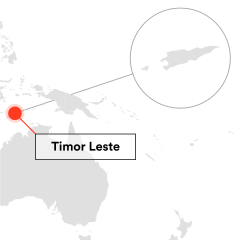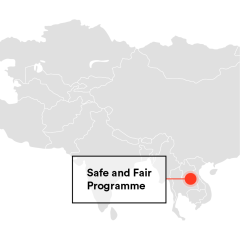Strengthen institutional approaches to prevention

Strengthen institutional approaches to prevention
Case Studies

In Timor-Leste, the percentage of the national budget allocated to the prevention and elimination of violence against women and girls became a significant point of concern, following a drastic funding reduction between 2019 and 2020. In 2019, 0.6 percent of the budget (10.4 million USD) was allocated to gender equality initiatives. This was reduced to a mere 0.1 percent of the budget (1.4 million USD) in 2020. Reductions in budget allocated to gender equality initiatives have adverse consequences that impede the protection of women’s rights and safety, the advancement of policies and programmes that address gender-based violence, as well as equitable access to education, healthcare, employment and other opportunities.
In order to address this, through Spotlight Initiative, Forum Komunikasaun Ba Feto Timor Loro Sa'e (FOKUPERS) actively engaged with different levels of government and 23 civil society organisations with the objective to increase budget allocations for preventing and ending violence against women and girls. This engagement also ensured that stakeholders had a greater understanding of the budget and budgeting process, so that they could actively engage, contribute to and monitor its implementation.
Spotlight Initiative’s efforts to strengthen gender-responsive budgeting in Timor-Leste have resulted in notable outcomes, including increased budget allocation for gender equality and increased confidence of civil society organisations in overseeing budget implementation.
Another key activity supported by Spotlight Initiative was capacity development on gender-responsive budgeting for community members, civil society organisations and local governments. The programme employed an innovative method that translated state budget execution and expenditures into simplified information using infographics. This training assisted stakeholders in acquiring the necessary skills to assess the coherence between the state budget, public policies, programmes and projects, and the impact on citizens and monitoring of the budget programmes. These efforts highlighted the important role civil society organisations can play in monitoring government activities, such as comprehensive budget analysis.



In Indonesia, nearly 65% of migrant workers are women. Women migrant workers send remittances back to their countries of origin providing critical support for the health, education and wellbeing of their families. They also contribute to the economy in their host countries like Indonesia. Nonetheless, they often struggle to be recognised as formal workers and face discrimination exploitation and violence at the hands of employers, co-workers, partners, law enforcement officials and even frontline service providers. In Indonesia, there has been important progress with the passage of a law to safeguard the rights of and improve services delivery to migrant workers. However, women migrant workers continue to face discrimination and violence and this worsened during the Covid-19 pandemic.
Spotlight Initiative worked with the Indonesia Ministry of Women Empowerment and Child Protection to develop and launch the “Guideline on the Protection of Women Migrant Workers during COVID-19” and the “Protocol for Handling Gender-Based Violence and Trafficking during COVID-19”. The Guideline and Protocol focused on the importance and relevance of adopting a ‘victim-centric approach’, which empowers victims to advocate for themselves to access quality services. They drew heavily from the “16 Essentials for Quality Multisectoral Service Provision to Women Migrant Workers Subject to Violence”, and aimed to serve as a key reference document for the government, service providers, community-based organisations and consular services for greater coordination and better support for women migrant workers.
In line with the guidelines, as a first response measure to COVID-19, the Ministry of Women’s Empowerment and Child Protection and SAF disseminated PPE kits to returning women migrant workers. The kits also included an information package with details and key contacts of service providers supporting GBV efforts. At a decentralised level, the programme supported the setting up of a referral mechanism in West Java with the articulation of key processes and protocols complementing the efforts.
In 2021, the SAF programme collaborated with the Ministry of Manpower and developed a complementary guideline that focused on Service Providers, which was integrated into the Minister of Manpower Decree No. 294/2020. In 2022, SAF in partnership with Migrant Workers Network continued its work and launched three additional campaigns as a part of Indonesia’s commitment to better protect migrant workers. Spearheaded by the Ministry of Manpower, the set of documents released include the Technical Guideline on Gender-Responsive Service and Protection for Indonesian Migrant Workers, the Standard Operational Procedure (SOP) for Private Placement Agency (P3MI) and the SOP for Technical Education and Vocational Training Centre (TVET/BLKLN) for Overseas on Services and Protection for Indonesian migrant workers in the New Adaptive.
Results: The Indonesian Protocols have been presented at international and regional forums. SAF has played a crucial role in supporting the creation of a dedicated protocol website for disseminating information nationally and at decentralised levels among partners. This has motivated other ASEAN partners to think about their labour migration frameworks and improve the working conditions of women migrant workers. For example, the Government of Vietnam sought SAF's assistance in adapting the Indonesian protocol to align with the Vietnamese context. Technical inputs were provided on the law governing Vietnamese workers employed abroad under contracts, and the ‘Standard Operating Procedures for Supporting Overseas Vietnamese Women Victims of Violence, Abuse, Sexual Harassment and Trafficking in Persons’.







